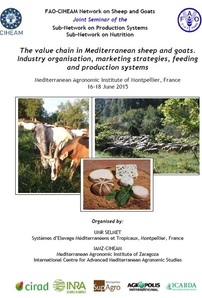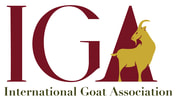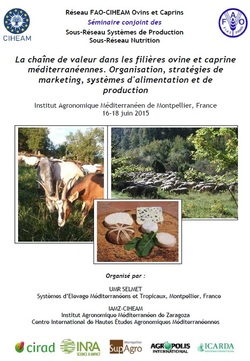 Download a PDF copy in English Download a PDF copy in English Background and objectives of the Seminar The value chain can be defined as the set of different activities required to bring a final product (e.g. meat, milk, leather, fiber) from the initial production phases to its final market destination. Value chain analysis is essential to an understanding of markets, the risks and the added value in each step, the participation and organization of different actors, and the factors that limit the income and competitiveness of farmers. Small ruminants are important for income generation and security, food supply and for the empowerment of rural livelihoods in the Mediterranean areas especially in mountainous and marginal regions. Nevertheless, Mediterranean sheep and goat sectors do not always produce and market their products efficiently, there being an important potential for increased livestock production output in quantity, quality and prices; and to improve economic margins through a more efficient marketing and distribution organization. Mediterranean systems of production of sheep and goat produce a large variety of typical products (meat, cheeses …) that could be valorized on some local or regional markets, if they are properly identified and marketed. As a consequence, the adaptations needed in the Mediterranean sheep and goat value chains in order to improve the products value and to optimize farmers’ income and competitiveness are of a different nature. Those modifications deal with the appropriate feeding strategies, adaptation of the production systems to the environmental conditions (e.g. water and heat stress), the market requirements, the building of new qualifications for the segmentation of the market, and the improvement of farmers’ organizations to enhance the capacity of all actors in the value chain to deal with the standards and regulations of local, regional and international markets. The INRA/SupAgro/CIRAD Joint Research Unit, “Tropical and Mediterranean Animal Production Systems” (Systèmes d’élevage méditerranéens et tropicaux, SELMET) and the Mediterranean Agronomic Institute of Zaragoza – CIHEAM organize this joint Seminar of the FAO-CIHEAM Sub-Networks on Production Systems and Nutrition on Sheep and Goats entitled “The value chain in Mediterranean sheep and goats. Industry organization, marketing strategies and production systems,” in Montpellier (France), from 16 to 18 June 2015. The objective of the Seminar is to encourage participation and interaction among scientists and technicians involved in small ruminant production systems, with a view to: (1) introduce the concepts and methodologies for value chain studies; (2) analyze the production systems enhancement, with special attention to feeding systems, needed to optimize the added value of sheep and goat products and/or to enhance the typicity of the local products; (3) to show the different options regarding the segmentation of the value chains into different “sub-chains”, able to valorize some typical products, and address the questions of the governance of these “sub-chains”. A particular focus will be done on the question of long and short distribution channels depending on the type of product; and (4) to study the impact of sector governance models on the value chain. Specific presentations of the consequence of feeding strategies on dairy and meat products will be held by the “FAO-CIHEAM Sheep and Goat Nutrition Subnetwork”. The organization of this joint seminar by the two subnetworks (Production Systems and Nutrition) will be a good opportunity to develop discussions and collaborations in order to promote small ruminants raised under different production systems and emerging challenges like climate change. Organization The Seminar is organized by INRA/SupAgro/CIRAD Joint Research Unit, “Tropical and Mediterranean Animal Production Systems” (Systèmes d’élevage méditerranéens et tropicaux, SELMET) and the Mediterranean Agronomic Institute of Zaragoza – CIHEAM, with the collaboration of the Mediterranean Agronomic Institute of Montpellier – CIHEAM, the Food and Agriculture Organization of the United Nations (FAO), the International Center for Agricultural Research in the Dry Areas (ICARDA) and Agropolis International. The Seminar will last two days providing a forum for scientific and technical exchanges and a one-day field trip. The scientific and technical exchanges will be structured in six sessions, with keynote guest speakers. The Seminar will also be open to free contributions. Grants, covering all or part of the expenses derived from the participation in the Seminar, will be awarded to applicants selected by the Scientific Committee. The venue of the Seminar will be: Mediterranean Agronomic Institute of Montpellier – CIHEAM 3191 route de Mende, 34093 Montpellier cedex 5, France Tél: [33] (0)4 67 04 60 00 Scientific Committee
Organisation Committee
Preliminary program
16 June 08.45 – 09.15 Registration 09.15 – 09.45 Opening ceremony 09.45 – 10.00 Presentation of the agenda and objectives of the Seminar 10.00 – 12.45 Session 1 (Plenary). The value chain in Mediterranean sheep and goats. Concepts, study methodologies and case studies 12.45 – 14.00 Lunch 14.00 – 17.30 Session 2.1. Marketing channels and type of sheep and goat products. 14.00 – 17.30 Session 2.2. Target feeding to produce quality products in vulnerable and intensive production systems 17 June 09.00 – 12.45 Session 3.1. Value chain and sector governance for the optimization of added value in Mediterranean sheep and goat products 09.00 – 12.45 Session 3.2. Digestion, performance and product quality on small ruminants exposed to environmental stressors 12.45 – 14.00 Lunch 14.00 – 17.30 Session 4 (Plenary). Optimization of sheep and goat product value through the production systems 17.30 Conclusions and closing of the Seminar 18 June All day Field trip to Causses and Cévennes (Roquefort cheese production area) Proceedings The Seminar Proceedings, including the text of keynote lectures, theatre presentations and posters accepted by the scientific committee will be published, if accepted, in the CIHEAM journal Options Méditerranéennes. Texts are to be written in English or French. Registration Please fill in the preliminary registration form available online at: www.iamz.ciheam.org/montpellier2015 Before 30 April 2015 registration fees for the two days of the seminar and the technical visit will be 250 euro, after which fees will be 300 euro. Fees include attendance to the Seminar, refreshments and lunches and a copy of the Proceedings. The mode of payment will be indicated in the Second Announcement. Languages The working languages of the Seminar will be English and French. Simultaneous interpretation will be provided. Call for proposals: Deadline 31 October 2014 Free contributions are welcome for all sessions, either as theatre presentations or posters. Participants who wish to present a free communication should submit their summary (maximum 250 words), indicating their preferred session, through the online submission form available at www.iamz.ciheam.org/montpellier2015 before 31 October 2014. The deadline for submission of the full text of communications accepted by the scientific committee is 27 February 2015. All accepted papers will be reviewed and published in the Seminar Proceedings. Accommodation Participants will be accommodated at the Hall of Residence of the Mediterranean Agronomic Institute of Montpellier, at very convenient rates, and, if needed, at hotels in Montpellier. A list of possible accommodations will be included in the second announcement. Scholarships The organizers will award a limited number of scholarships that may cover registration fees, accommodation and travel. Applications, together with the corresponding CV, should be submitted 31 October 2014 through the online submission form available at www.iamz.ciheam.org/montpellier2015. Preference will be given to participants from less developed countries whose paper has been accepted by the Scientific Committee.
6 Comments
Dr. Emad El-Islam Taha
7/22/2014 08:04:28 am
Reply
Mengistu Russom Araya
11/21/2014 01:39:47 am
I am an Eritrean citizen, Ph.D. student in national Dairy Research Institute, India. I am very much interested in goat production as goat is one of the prominent domestic animal in my country for milk and meat production but I lately found this information. Therefore, I would like to ask if there is any possibility to include me in the conference.
Reply
11/21/2014 02:35:00 am
Hello Mengistu Russom Araya,
Reply
1/10/2015 10:34:02 am
Dear Sir
Reply
Prof Ramesh Gupta
1/29/2015 10:42:54 am
I am interested in this seminar and like to know more
Reply
Leave a Reply. |
IGA Blog
The International Goat Association promotes goat research and development for the benefit of humankind, to alleviate poverty, to promote prosperity and to improve the quality of life. Archives
May 2024
Categories
All
|
|
International Goat Association
2516 Millbrook Rd., Little Rock, AR72227 USA email: [email protected] -454-1641 |




 RSS Feed
RSS Feed